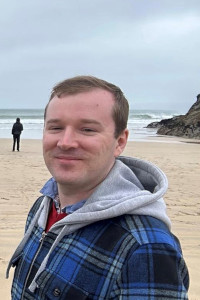Main menu
You are here
Home ›Crew 292 Daniel Loy

Daniel Loy
Profile:
Daniel Loy is a first year Astrobiology PhD student from the Open University (UK) who will be fulfilling the roles of Crew Biologist and Health and Safety Officer for Crew 292. In his PhD project he is investigating and characterising the microbial communities and their interactions with the host sediments of the Makgadikgadi Basin in Botswana. The Makgadikgadi contains several salt flats with conditions that are very similar to ancient Mars, so this research will also be used as an analogue for the Noachian-Hesperian transition in Mars’ early history.
Daniel is a Junior Officer with the Royal Naval Reserves in the UK alongside his current studentship. He has previously investigated halophiles during his Masters research project with a focus on entombing microorganisms in salt to study how rapidly they recover and grow once outside of the crystals.
Research:
As the Crew Biologist, Daniel’s project will focus on recovering and extracting DNA from halophiles and other extremophiles to investigate the functional and taxonomic diversity of salt deposits and other gathered samples. Daniel will build on the established foundation of the research conducted in previous analog missions at the MDRS through the application of cultivation-dependant techniques that he developed during his Masters research project on recovery of entombed halophiles from salt crystals to isolate cultures of halophile; growth experiments will then be used to identify the metabolic potential of these isolates.
Daniel will also develop, modify and employ field-appropriate cultivation-independent techniques; this will involve use of the Bento Lab, a portable centrifuge, gel station and PCR machine, in combination with Hot Start PCR polymerases, PCR primers for an array of biogeochemical cycling genes and the MoBio DNA extraction kit, which will be modified for application with reduced facilities. With this combination of equipment, Daniel will perform DNA extractions in the hab-unit with both his isolates and Utah Desert Samples collected under mission-simulated conditions. These DNA samples will then be screened for functional genes via PCR.
This combination of techniques will provide baseline of fundamental cultivation dependant (isolations) and cultivation independent techniques (DNA extraction and PCR) that are achievable under analog mission parameters. This will then form the methodological framework for training framework and protocols that could then be carried out by non-biologists for future crews, at the MDRS, the Ladakh research station site or other locations. These techniques also represent more low-cost and sustainable techniques that can be carried out long-term and do not depend on reagents with a short shelf life.

